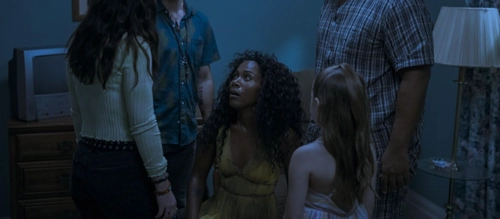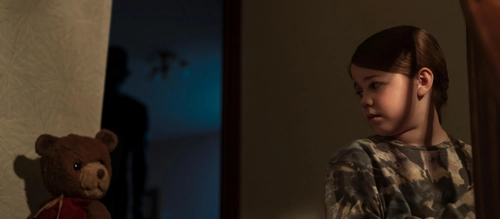
Imaginary (2024)
Director: Jeff Wadlow
Screenwriters: Jeff Wadlow, Greg Erb, Jason Oremland
Starring: DeWanda Wise, Tom Payne, Betty Buckley, Taegen Burns, Pyper Braun, Matthew Sato, Veronica Falcón
One tries not to pass too much judgement on anything before they go in to watch a film. Jeff Wadlow, after all, came out with Netflix’s The Curse of Bridge Hollow a little while ago, which whilst it wasn’t stellar, was a cosy little family spook-fest for Halloween. And Blumhouse themselves, one of the production companies behind Imaginary, despite putting out a raft of stinkers, have come out with some stellar films in the past. Just like Hammer Films of old, they have made loads of low budget thrillers and occasionally some have been stellar. Art always has the ability to surprise, and so does the horror film industry.
But when the lights go down and we find a family moving into the step-mother’s old home, a home she can’t remember much about after fleeing in mysterious circumstances at five years old, there’s a nagging suspicion at the back of our minds. The youngest stepdaughter, Alice, gets an imaginary friend in the form of a big stuffed bear she calls Chauncey that she found hidden away in the basement. Before even fifteen minutes have rolled past, including a dream sequence cold open (heaven help us), we have the nagging suspicion that not only is this going to be a Blumhouse film, but it will be the most Blumhouse of Blumhouse horror pictures ever put to celluloid.
This is not to say that it is a complete waste of time. The main trio of Jessica (DeWanda Wise), with her stepdaughters Alice and Taylor (Taegen Burns and Pyper Braun respectively), manage some decent performances at the times when they’re given something other than the most clichéd, stock lines ever devised by man. Braun especially, for a such a young actress, performs admirably. The final otherworld location has one or two interesting shots in it, designs that look like the Illusionary Maze in Labyrinth. It’s just such a shame that most of the time they decide to keep everything on the flat instead of playing around with the strange, surreal aspects of it, using it just as a basic platform for basic scares and not doing too much with it.
Here, then, is the main issue with Imaginary. Ironically for it’s name, there is a significant lack of imagination involved. Maybe it’s the imagination that is imaginary. It is a composite of various parts from other films stitched together into something distinctly lacking in anything new or fresh. One recalls M3GAN, The Bogeyman, and even Grady Hendrix’s novel “How to Sell a Haunted House” whilst watching. You can see the Pan’s Labyrinth reference, and even Insidious: The Red Door. Just change the colour of the door to blue and nobody will know. They might even forget it was the same company that made it. We won’t even go into detail just how cringeworthy it is to hear a blatant usage of the ‘Stranger Things’ theme two thirds of the way in. Even if it was the composer’s own version of it, it’s so close to the original that you’ll want to throw your popcorn at the screen in annoyance. How blatant can filmmakers be when signalling that they don’t know where to go organically, even in the score?

Even if you haven’t been around horror for the past few years, you can smell every moment coming a mile away, every twist and turn, even if they make no actual sense. Even if they try to make reveals which have no clues leading up to their reveal, thereby making them impossible to predict; you just know it’s coming in your guts. Worse, it falls into the trap of films such as Haute Tension (2003) by having the big reveal seem more interesting on the page than it is when it’s actually executed on screen, a reveal that falls apart when one thinks about it for more than half a second.
Even worse than the film being a rehash of earlier ideas is the abhorrent dialogue we’re treated to. One might suffer a reworking of older ideas if it’s presented in a palatable format; this is the reason we still watch romcoms and alien-invasion films and old westerns with exactly the same scenery. We might have seen the film before, but if it’s well-made, we can bear it. Unfortunately, poor Betty Buckley, a stalwart of horror going all the way back to Carrie in 1976, is given some of the most abysmal dialogue ever created, so bad that it might have been made by AI. There’s no life, no thought, no attempt to do anything than give the veteran the blandest exposition, written in the most cringe-inducing fashion. Somehow, everyone else’s lines seem worse when they’re around her, like some sort of plague. It’s not Buckley’s fault; it’s the fault of the writers.
The most painful part of Imaginary is watching something that might be half ok, with actresses and set designers straining at leashes to be allowed to do something even remotely interesting, being held back by a script so shoddily put together that it reeks of laziness. With so little to work with, can you blame the direction for being half-hearted at best? At least not every scene is a jump scare, but then again, most of that is ruined by the lighting being so awful in the darker scenes that it’s impossible to see what we’re not meant to see. Those moments of ‘was that a ghost or just an ordinary shadow in the corner of the room’ only work when we can see clearly enough that there’s a shadow we’re meant to be questioning. Somehow, that seems an apt metaphor for the film.
Score: 7/24

